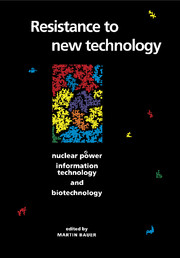Book contents
1 - Resistance to new technology and its effects on nuclear power, information technology and biotechnology
Published online by Cambridge University Press: 06 July 2010
Summary
Basic questions
The word ‘resistance’ has become unsuitable for use in the context of new technology. The allegation is that it serves mainly to blame those who resist; talking about resistance implies a managerial and technocratic bias. However, in developing the idea for this conference, I was confident that ‘resistance’ would prove ambiguous in meaning and rich in connotations, particularly in the European context.
Historians of technology recently rediscovered ‘resistance’ as a ‘force’ that shapes technology which requires an adequate analysis (Mokyr 1990, 1992). For the economist resistance is basically the vested interests of old capital in ideas, skills and machinery. In addition, in the light of the critique of the ‘Whiggish’ historiography of technology (Staudenmaier 1985), it seems reasonable to lift ‘resistance’ from the dustbin of history.
Artefacts such as machines, power stations, computers, telephones, broadcasts and genetically engineered tomatoes, and the practice of their production, handling, marketing and use – in other words, technological innovations – are not the only factors of historical change. Technological determinism seems an inadequate account of our history. Various social activities give form to processes and products, facilitate their diffusion and mitigate their consequences. However, technology is not neutral. It creates opportunities and simultaneously constrains human activity. We experience the latter as being paced by ‘machines’ rather than controlling them. The selection of options is not neutral; it is likely to be contested and in need of legitimation.
- Type
- Chapter
- Information
- Resistance to New TechnologyNuclear Power, Information Technology and Biotechnology, pp. 1 - 42Publisher: Cambridge University PressPrint publication year: 1995
- 25
- Cited by

